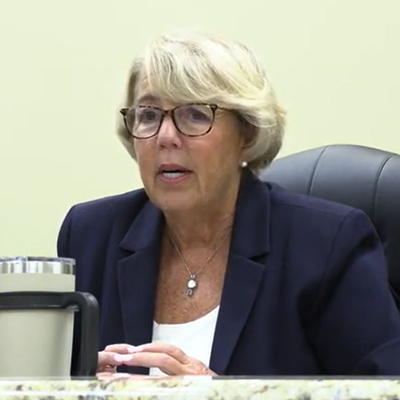
The New Jersey Board of Public Utilities (BPU) approved a new benchmarking program Wednesday that will require 30,000 apartment, commercial and other buildings of more than 25,000 square feet to annually report their water, gas and electricity use in an effort to stimulate conservation and cut energy use.
Approving the initiative in a 5-0 vote, the board said the program is designed to be minimally intrusive for building owners and is necessary as the state shoots for a goal of 100% clean energy use by 2050 as set out by Gov. Phil Murphy. The benchmarking plan was recommended in Murphy’s 2019 Energy Master Plan, and the initial plan triggered a variety of stakeholder concerns, which included the need to protect customer data privacy and the potential burden for building owners and utilities of complying with the program.
 BPU President Joseph L. Fiordaliso | NJ BPU
BPU President Joseph L. Fiordaliso | NJ BPUBenchmarking “enables commercial building owners and operators to measure and analyze their facilities’ energy (all sources and fuels) and water use and compare performance to that of similar buildings,” the board order approving the program said. “Owners and operators can then assess opportunities for performance improvements that reduce their buildings’ energy use and costs.”
Speaking before the vote, BPU President Joseph Fiordaliso said the goal of the program is to “save and conserve.”
“It was intended to help promote our energy efficiency and to conserve water and operating costs,” he said. “And by doing that, the cheapest energy is the energy we don’t use. The cheapest water is the water we don’t use.”
The implementation of the benchmarking initiative comes as the BPU considers another program designed to gather energy data in the hope that energy users will use it to reduce consumption and cut costs. A straw proposal under consideration by the board sets out rules for the use of advanced meters infrastructure, involving so-called smart meters that automatically collect and transmit electricity use data, providing customers with a real-time assessment of their energy use. (See NJ Eyes Rules to Protect, Gather Advanced Metering Data.)
Which buildings to benchmark?
Under the benchmarking program, aggregated data for the buildings covered by the program — which includes commercial buildings, apartment properties housing more than five families and public buildings — will be provided to the property owner by utilities. The list of buildings covered by the program will be drawn from the state tax assessment database.
To provide some anonymity to customers, buildings that have four or more tenants or have no single tenant that uses more than 50% of the energy will be able to collect energy use for the whole building and divide it among the tenants. The system, known as the “4/50 rule,” avoids the need to attribute private energy use information to a specific tenant. If a building has fewer than four tenants, or one tenant uses more than 50% of the energy in the building, the building owner must ask each tenant to consent to give the owner the water and energy data.
To help building owners and managers complete the benchmarking requirements, the BPU will develop a Certified Benchmarker program, creating a pool of experts for hire available to help, and also an informational benchmarking website. In addition, the board will create a customer help desk to “support outreach, manage communications with, process requests for exemptions, and perform services as needed for building owners.”
 BPU Commissioner Dianne Solomon | NJ BPU
BPU Commissioner Dianne Solomon | NJ BPUThe deadline by which the first round of benchmarking data must be delivered is Oct. 1, 2023, with a July 1 submission deadline in the succeeding year.
Commissioner Dianne Solomon said that she hoped the program would not unnecessarily burden businesses.
“We don’t want this to be punitive,” she said. “This should be a help, not something that the data and the information should be used in a manner which is punitive on these businesses and individuals. They have a lot of other things to be concerned about in keeping a business operating these days. We don’t want to be one more hurdle that they need to overcome.”
Philip Chao, the BPU officer who presented the plan, said he believed the annual benchmarking process would only take four or five hours per building. The BPU order for the program said the state was not required by law to benchmark its own buildings but opted to include them to “lead by example in benchmarking its buildings in the same manner that commercial building owners do.”
Program rules allow utilities to recover “reasonable and prudent costs” incurred implementing the benchmarking requirements, including “establishing, operating, and maintaining data aggregation and data access services, for the board to evaluate in future base rate case proceedings.”
Stakeholder Concern
More than a dozen stakeholders offered comments on the proposal at a Jan. 6 public hearing and in writing. Commenters included the New Jersey Division of Rate Counsel, the New Jersey Builders Association, utilities such as PSE&G and Rockland Electric Company, and the Natural Resources Defense Council (NRDC).
The question of which buildings should be covered by the program stoked a variety of suggestions and concerns that limiting the buildings covered would be detrimental to program goals.
In a Jan. 20 letter to the board, NRDC said the exclusion of multifamily dwellings and apartments, public school property, and government buildings would “undermine the achievement of New Jersey’s ambitious decarbonization goals.”
“Effective building energy benchmarking has been shown to be a critical first-step tool to increase building energy efficiency and decarbonization,” the letter said, adding that it “is especially important in New Jersey, where buildings are the second largest source of climate pollutants after vehicles.”
In response, the BPU broadened the buildings covered to include multi-family dwelling and apartments and public buildings. Explaining the decision to include multi-family properties, the BPU said owners are typically “commercial enterprises” and are large users of energy “with tremendous potential to save energy and water and reduce waste of such resources.”
In addition, their inclusion would stimulate energy conservation measures and provide the benefits of “reduced energy bills and energy burdens, reduced greenhouse emissions, improved indoor air quality” and general health benefits that would help renters, including low- and moderate-income residents and those in affordable housing.
South Jersey Industries and the New Jersey Utilities Association (NJUA) expressed concerns about protecting customer data privacy and noted that New Jersey law requires customers to give their consent before a utility can release data to a third party.
“The Utilities are concerned that the release of customer information to third-parties may be violative of customer privacy rules,” the NJUA wrote in a Jan. 20 letter to the board. New Jersey allows a utility to release “individual proprietary information” only when it will be used only for the “provision of continued electric generation service, electric related service, gas supply service or gas related service to that customer,” which does not appear to include a benchmarking program, the letter said.
PSE&G, in a Jan. 20 letter, said it also has “significant concerns,” about the program’s handling of customer data, “in particular upon what basis and to whom specifically the requested customer information can be provided without consent.” The utility, along with other stakeholders, expressed a separate concern that the BPU’s straw proposal suggested enforcing participation in the benchmarking program by saying participation is a “prerequisite” for participation in any other BPU programs, such as energy efficiency (EE) programs.
PSE&G said such an approach could create “an undue burden on the EE programs [that] unfairly punishes building owners, tenants, and utilities for issues that may be beyond their control.”
In response, the BPU dropped the requirement that benchmarking be a prerequisite for involvement in other programs. The concerns about data privacy prompted the BPU to require that utilities provide building owners with “aggregated building level data” to ensure customer anonymity and also to craft the “4/50 rule.”
The BPU staff “recognizes that data aggregation is necessary to ensure the anonymization of individual tenant consumption data,” the order approving the program said.


